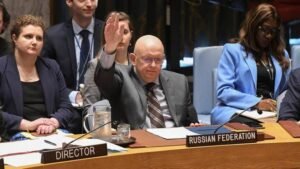The United Nation Security Council passed its first resolution endorsing the ceasefire plan proposed by American President Joe Biden with an overwhelming majority on Monday, June 10.
Out of the total 15 members present in the Security Council, 14 members approved the ceasefire proposal. Russia abstained from voting on the proposal. The proposal calls on Israel and Hamas “to fully implement its terms without delay and without condition.”
🇺🇳🇵🇸🇮🇱 UNSC Adopts U.S.-Proposed Gaza Ceasefire
Hamas welcomes the truce, expressing readiness for indirect negotiations with Israel after Tel Aviv’s (long overdue) acceptance of the proposal
IN FAVOR: 14 Votes
ABSTAIN: 1 Russia
AGAINST: 0Moscow raises eyebrows over the U.S.… pic.twitter.com/PxUNVaxBvp
— HOT SPOT (@HotSpotHotSpot) June 10, 2024
Three Phased Plan
The proposed plan accepted by Israel comprises three phases. During Phase 1, a safe distribution of humanitarian assistance will be provided “at scale throughout the Gaza strip,” comprising 600 trucks with aid entering the strip every day.
In Phase 2, “a permanent end to hostilities in exchange for the release of all other hostages still in Gaza, and a full withdrawal of Israeli forces from Gaza” will take place.
The final phase would launch “a major multi-year construction plan for Gaza and the return of the remains of any deceased hostages still in Gaza to their families.” Additionally, the resolution also includes the “importance of unifying the Gaza Strip with the West Bank under the Palestinian Authority,” a part of the deal which is in contention with Netanhayu’s right wing government.
Will they accept the ceasefire plan?
While the Security Council has strongly supported the resolution, both Israel and Hamas are skeptical of the deal. Israel has shown unwavering determination to “continue until all of the hostages are returned and until Hamas’ military and governing capabilities are dismantled.”
“This also means that Israel will not engage in meaningless and endless negotiations, which can be exploited by Hamas as a means to stall for time,”Minister Counsellor Reut Shapir Ben said.
On the other hand, there has been too much international pressure on the Hamas group to accept the ceasefire deal. Subsequently, Hamas has welcomed the adoption of the resolution and signaled willingness to cooperate with Israel for its implementation. However, the group emphasized that they would continue their struggle against Israeli occupation and work on setting up a “fully sovereign” Palestinian state.
Meanwhile, the country that gave birth to the ceasefire deal believes that it is “the best, most realistic opportunity to bring at least a temporary halt to this war.”The resolution states that Israel has accepted the ceasefire proposal, and urges Hamas to agree to it too. US ambassador Linda Thomas said that the resolution’s adoption by the UNSC has “sent a clear message to Hamas to accept the ceasefire deal on the table.” “The fighting could stop today, if Hamas would do the same. I repeat, this fighting could stop today,” she added.
Also Read: Thailand strives to boost tourism, offers visa-free travel for Indians, starting June
Russia dubious of Israel’s intentions

One of the five permanent security members, Russia has abstained from voting on the ceasefire deal. The Russian UN ambassador Vassily Nebenzia said that Moscow abstained on Monday’s vote, accusing the US of not disclosing entire details of the three phased ceasefire deal and added that Moscow has “a whole host of questions.”
“Hamas is called upon to accept this so-called deal, but still, there is no clear clarity regarding official agreement from Israel,” Nebenzia said.
Doubting Israel’s intention over the carnage in the Gaza strip, Nebenzia asked, “Given the many statements from Israel on the extension of the war until Hamas is completely defeated … What specifically has Israel agreed to?”
Moreover, Israel’s indirect response to the ceasefire deal has further fueled the ambiguity over its intentions in Gaza and whether it will eventually accept the deal or not.












Comments 1